Corporate Strategy and Governance: TESCO Case Study Analysis
VerifiedAdded on 2021/01/02
|9
|1942
|150
Report
AI Summary
This report provides a comprehensive analysis of the corporate governance issues faced by TESCO, a leading brand in the retail sector. The study begins with an introduction outlining the purpose of the research, the academic topic area, and the specific business context problem related to TESCO's accounting and auditing practices, which led to its low ranking in the FTSE 100. A thorough literature review explores the concept of corporate governance, the reasons behind TESCO's low ranking, the impact on its operations and brand image, and strategies to overcome these challenges. The research then presents the research questions, methodology, including research design, primary and secondary data sources, and ethical considerations. The report aims to understand the concept of corporate governance, identify the reasons for TESCO's low ranking, determine the impact on its operations and brand image, and evaluate ways TESCO can improve its corporate governance. The methodology includes experimental research with a pragmatist philosophy, and the collection of primary data through questionnaires distributed to 100 employees, and secondary data from various sources like books, journals, and online resources.
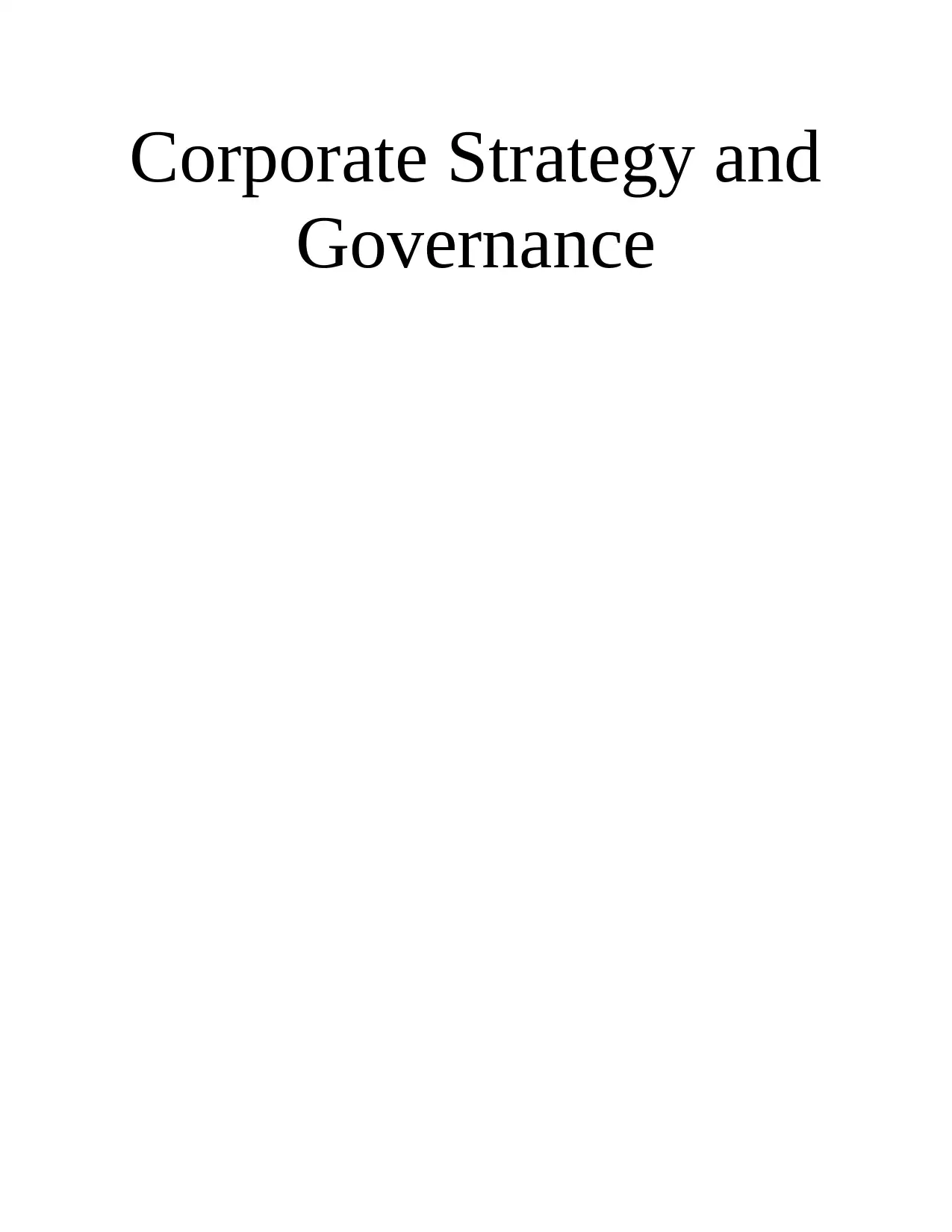
Corporate Strategy and
Governance
Governance
Paraphrase This Document
Need a fresh take? Get an instant paraphrase of this document with our AI Paraphraser
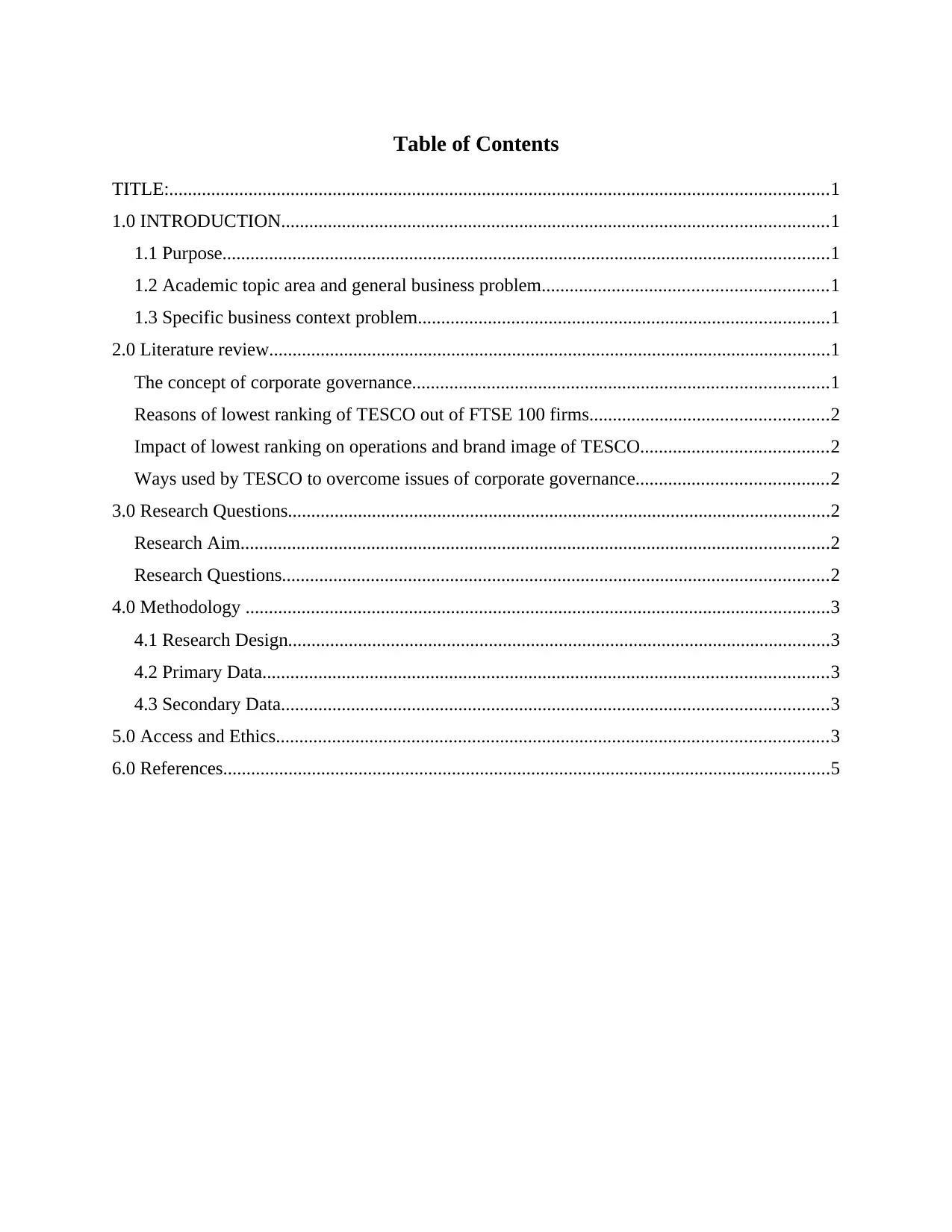
Table of Contents
TITLE:.............................................................................................................................................1
1.0 INTRODUCTION.....................................................................................................................1
1.1 Purpose..................................................................................................................................1
1.2 Academic topic area and general business problem.............................................................1
1.3 Specific business context problem........................................................................................1
2.0 Literature review........................................................................................................................1
The concept of corporate governance.........................................................................................1
Reasons of lowest ranking of TESCO out of FTSE 100 firms...................................................2
Impact of lowest ranking on operations and brand image of TESCO........................................2
Ways used by TESCO to overcome issues of corporate governance.........................................2
3.0 Research Questions....................................................................................................................2
Research Aim..............................................................................................................................2
Research Questions.....................................................................................................................2
4.0 Methodology .............................................................................................................................3
4.1 Research Design....................................................................................................................3
4.2 Primary Data.........................................................................................................................3
4.3 Secondary Data.....................................................................................................................3
5.0 Access and Ethics......................................................................................................................3
6.0 References..................................................................................................................................5
TITLE:.............................................................................................................................................1
1.0 INTRODUCTION.....................................................................................................................1
1.1 Purpose..................................................................................................................................1
1.2 Academic topic area and general business problem.............................................................1
1.3 Specific business context problem........................................................................................1
2.0 Literature review........................................................................................................................1
The concept of corporate governance.........................................................................................1
Reasons of lowest ranking of TESCO out of FTSE 100 firms...................................................2
Impact of lowest ranking on operations and brand image of TESCO........................................2
Ways used by TESCO to overcome issues of corporate governance.........................................2
3.0 Research Questions....................................................................................................................2
Research Aim..............................................................................................................................2
Research Questions.....................................................................................................................2
4.0 Methodology .............................................................................................................................3
4.1 Research Design....................................................................................................................3
4.2 Primary Data.........................................................................................................................3
4.3 Secondary Data.....................................................................................................................3
5.0 Access and Ethics......................................................................................................................3
6.0 References..................................................................................................................................5

⊘ This is a preview!⊘
Do you want full access?
Subscribe today to unlock all pages.

Trusted by 1+ million students worldwide
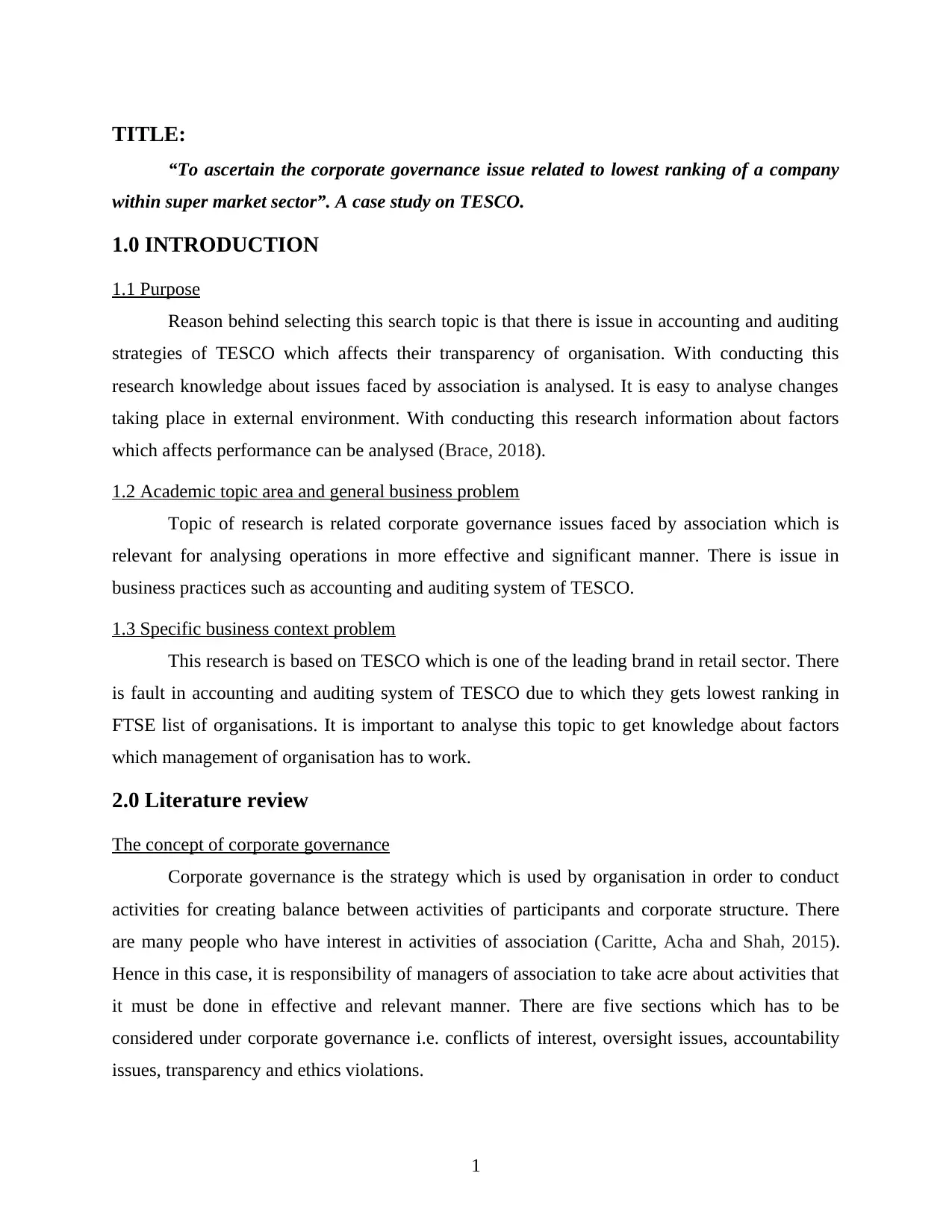
TITLE:
“To ascertain the corporate governance issue related to lowest ranking of a company
within super market sector”. A case study on TESCO.
1.0 INTRODUCTION
1.1 Purpose
Reason behind selecting this search topic is that there is issue in accounting and auditing
strategies of TESCO which affects their transparency of organisation. With conducting this
research knowledge about issues faced by association is analysed. It is easy to analyse changes
taking place in external environment. With conducting this research information about factors
which affects performance can be analysed (Brace, 2018).
1.2 Academic topic area and general business problem
Topic of research is related corporate governance issues faced by association which is
relevant for analysing operations in more effective and significant manner. There is issue in
business practices such as accounting and auditing system of TESCO.
1.3 Specific business context problem
This research is based on TESCO which is one of the leading brand in retail sector. There
is fault in accounting and auditing system of TESCO due to which they gets lowest ranking in
FTSE list of organisations. It is important to analyse this topic to get knowledge about factors
which management of organisation has to work.
2.0 Literature review
The concept of corporate governance
Corporate governance is the strategy which is used by organisation in order to conduct
activities for creating balance between activities of participants and corporate structure. There
are many people who have interest in activities of association (Caritte, Acha and Shah, 2015).
Hence in this case, it is responsibility of managers of association to take acre about activities that
it must be done in effective and relevant manner. There are five sections which has to be
considered under corporate governance i.e. conflicts of interest, oversight issues, accountability
issues, transparency and ethics violations.
1
“To ascertain the corporate governance issue related to lowest ranking of a company
within super market sector”. A case study on TESCO.
1.0 INTRODUCTION
1.1 Purpose
Reason behind selecting this search topic is that there is issue in accounting and auditing
strategies of TESCO which affects their transparency of organisation. With conducting this
research knowledge about issues faced by association is analysed. It is easy to analyse changes
taking place in external environment. With conducting this research information about factors
which affects performance can be analysed (Brace, 2018).
1.2 Academic topic area and general business problem
Topic of research is related corporate governance issues faced by association which is
relevant for analysing operations in more effective and significant manner. There is issue in
business practices such as accounting and auditing system of TESCO.
1.3 Specific business context problem
This research is based on TESCO which is one of the leading brand in retail sector. There
is fault in accounting and auditing system of TESCO due to which they gets lowest ranking in
FTSE list of organisations. It is important to analyse this topic to get knowledge about factors
which management of organisation has to work.
2.0 Literature review
The concept of corporate governance
Corporate governance is the strategy which is used by organisation in order to conduct
activities for creating balance between activities of participants and corporate structure. There
are many people who have interest in activities of association (Caritte, Acha and Shah, 2015).
Hence in this case, it is responsibility of managers of association to take acre about activities that
it must be done in effective and relevant manner. There are five sections which has to be
considered under corporate governance i.e. conflicts of interest, oversight issues, accountability
issues, transparency and ethics violations.
1
Paraphrase This Document
Need a fresh take? Get an instant paraphrase of this document with our AI Paraphraser
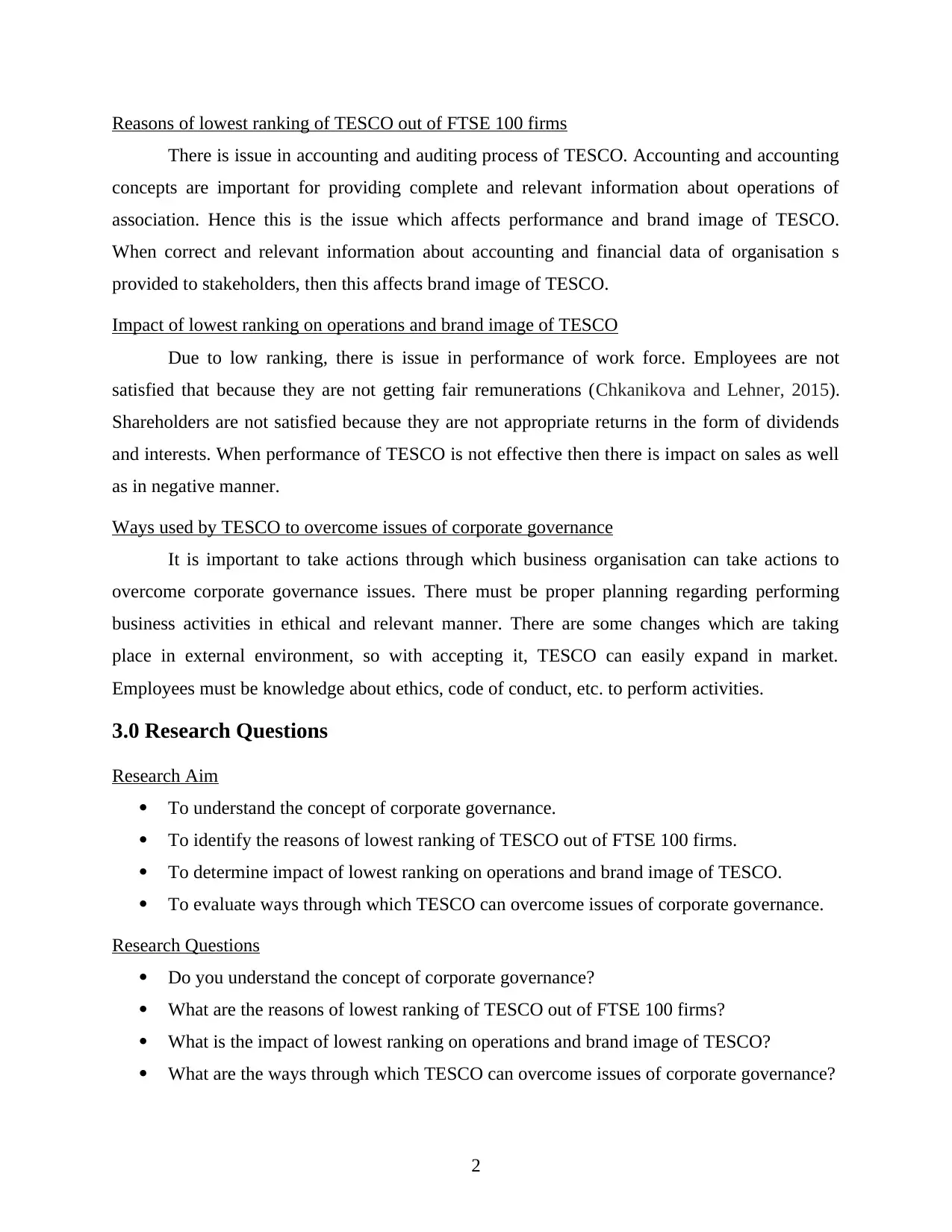
Reasons of lowest ranking of TESCO out of FTSE 100 firms
There is issue in accounting and auditing process of TESCO. Accounting and accounting
concepts are important for providing complete and relevant information about operations of
association. Hence this is the issue which affects performance and brand image of TESCO.
When correct and relevant information about accounting and financial data of organisation s
provided to stakeholders, then this affects brand image of TESCO.
Impact of lowest ranking on operations and brand image of TESCO
Due to low ranking, there is issue in performance of work force. Employees are not
satisfied that because they are not getting fair remunerations (Chkanikova and Lehner, 2015).
Shareholders are not satisfied because they are not appropriate returns in the form of dividends
and interests. When performance of TESCO is not effective then there is impact on sales as well
as in negative manner.
Ways used by TESCO to overcome issues of corporate governance
It is important to take actions through which business organisation can take actions to
overcome corporate governance issues. There must be proper planning regarding performing
business activities in ethical and relevant manner. There are some changes which are taking
place in external environment, so with accepting it, TESCO can easily expand in market.
Employees must be knowledge about ethics, code of conduct, etc. to perform activities.
3.0 Research Questions
Research Aim
To understand the concept of corporate governance.
To identify the reasons of lowest ranking of TESCO out of FTSE 100 firms.
To determine impact of lowest ranking on operations and brand image of TESCO.
To evaluate ways through which TESCO can overcome issues of corporate governance.
Research Questions
Do you understand the concept of corporate governance?
What are the reasons of lowest ranking of TESCO out of FTSE 100 firms?
What is the impact of lowest ranking on operations and brand image of TESCO?
What are the ways through which TESCO can overcome issues of corporate governance?
2
There is issue in accounting and auditing process of TESCO. Accounting and accounting
concepts are important for providing complete and relevant information about operations of
association. Hence this is the issue which affects performance and brand image of TESCO.
When correct and relevant information about accounting and financial data of organisation s
provided to stakeholders, then this affects brand image of TESCO.
Impact of lowest ranking on operations and brand image of TESCO
Due to low ranking, there is issue in performance of work force. Employees are not
satisfied that because they are not getting fair remunerations (Chkanikova and Lehner, 2015).
Shareholders are not satisfied because they are not appropriate returns in the form of dividends
and interests. When performance of TESCO is not effective then there is impact on sales as well
as in negative manner.
Ways used by TESCO to overcome issues of corporate governance
It is important to take actions through which business organisation can take actions to
overcome corporate governance issues. There must be proper planning regarding performing
business activities in ethical and relevant manner. There are some changes which are taking
place in external environment, so with accepting it, TESCO can easily expand in market.
Employees must be knowledge about ethics, code of conduct, etc. to perform activities.
3.0 Research Questions
Research Aim
To understand the concept of corporate governance.
To identify the reasons of lowest ranking of TESCO out of FTSE 100 firms.
To determine impact of lowest ranking on operations and brand image of TESCO.
To evaluate ways through which TESCO can overcome issues of corporate governance.
Research Questions
Do you understand the concept of corporate governance?
What are the reasons of lowest ranking of TESCO out of FTSE 100 firms?
What is the impact of lowest ranking on operations and brand image of TESCO?
What are the ways through which TESCO can overcome issues of corporate governance?
2
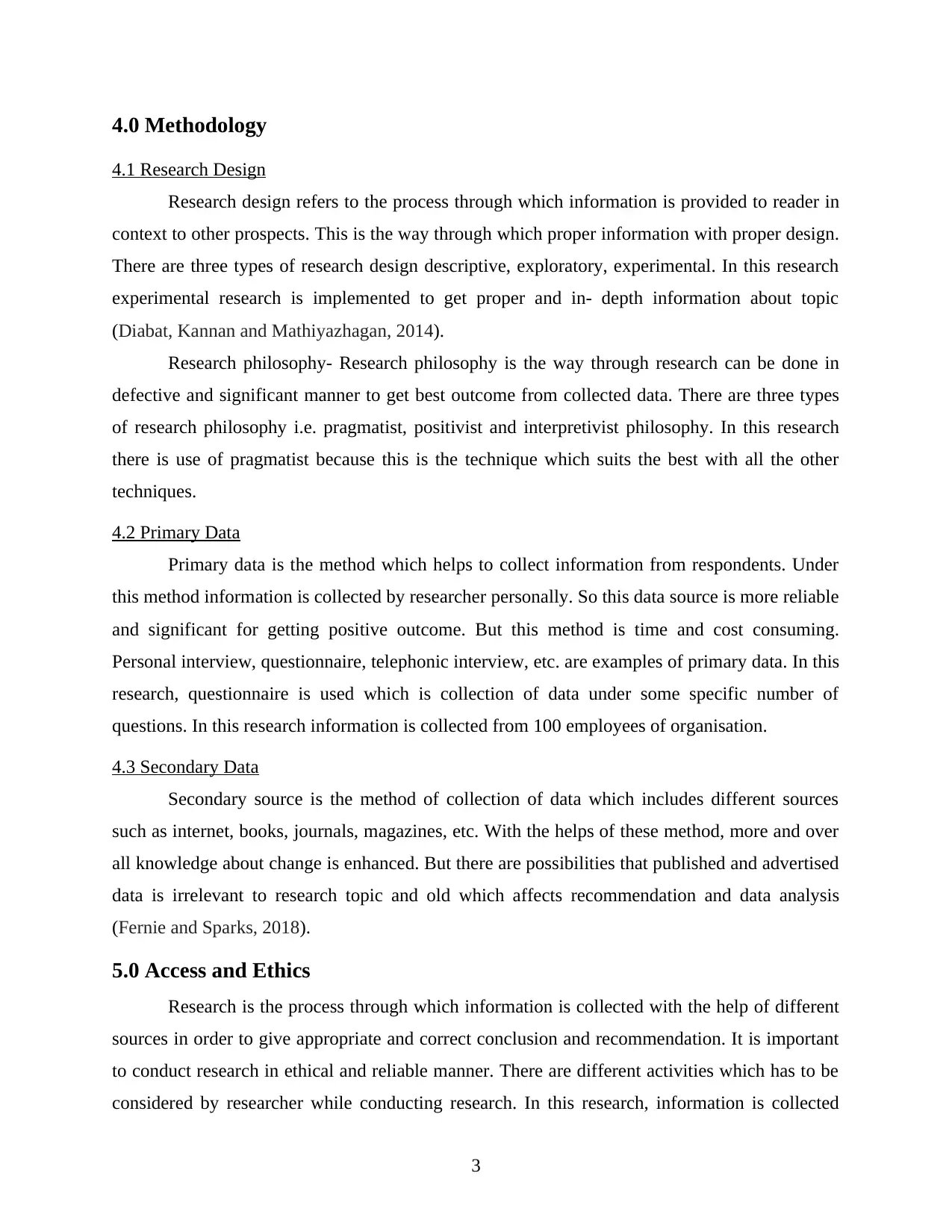
4.0 Methodology
4.1 Research Design
Research design refers to the process through which information is provided to reader in
context to other prospects. This is the way through which proper information with proper design.
There are three types of research design descriptive, exploratory, experimental. In this research
experimental research is implemented to get proper and in- depth information about topic
(Diabat, Kannan and Mathiyazhagan, 2014).
Research philosophy- Research philosophy is the way through research can be done in
defective and significant manner to get best outcome from collected data. There are three types
of research philosophy i.e. pragmatist, positivist and interpretivist philosophy. In this research
there is use of pragmatist because this is the technique which suits the best with all the other
techniques.
4.2 Primary Data
Primary data is the method which helps to collect information from respondents. Under
this method information is collected by researcher personally. So this data source is more reliable
and significant for getting positive outcome. But this method is time and cost consuming.
Personal interview, questionnaire, telephonic interview, etc. are examples of primary data. In this
research, questionnaire is used which is collection of data under some specific number of
questions. In this research information is collected from 100 employees of organisation.
4.3 Secondary Data
Secondary source is the method of collection of data which includes different sources
such as internet, books, journals, magazines, etc. With the helps of these method, more and over
all knowledge about change is enhanced. But there are possibilities that published and advertised
data is irrelevant to research topic and old which affects recommendation and data analysis
(Fernie and Sparks, 2018).
5.0 Access and Ethics
Research is the process through which information is collected with the help of different
sources in order to give appropriate and correct conclusion and recommendation. It is important
to conduct research in ethical and reliable manner. There are different activities which has to be
considered by researcher while conducting research. In this research, information is collected
3
4.1 Research Design
Research design refers to the process through which information is provided to reader in
context to other prospects. This is the way through which proper information with proper design.
There are three types of research design descriptive, exploratory, experimental. In this research
experimental research is implemented to get proper and in- depth information about topic
(Diabat, Kannan and Mathiyazhagan, 2014).
Research philosophy- Research philosophy is the way through research can be done in
defective and significant manner to get best outcome from collected data. There are three types
of research philosophy i.e. pragmatist, positivist and interpretivist philosophy. In this research
there is use of pragmatist because this is the technique which suits the best with all the other
techniques.
4.2 Primary Data
Primary data is the method which helps to collect information from respondents. Under
this method information is collected by researcher personally. So this data source is more reliable
and significant for getting positive outcome. But this method is time and cost consuming.
Personal interview, questionnaire, telephonic interview, etc. are examples of primary data. In this
research, questionnaire is used which is collection of data under some specific number of
questions. In this research information is collected from 100 employees of organisation.
4.3 Secondary Data
Secondary source is the method of collection of data which includes different sources
such as internet, books, journals, magazines, etc. With the helps of these method, more and over
all knowledge about change is enhanced. But there are possibilities that published and advertised
data is irrelevant to research topic and old which affects recommendation and data analysis
(Fernie and Sparks, 2018).
5.0 Access and Ethics
Research is the process through which information is collected with the help of different
sources in order to give appropriate and correct conclusion and recommendation. It is important
to conduct research in ethical and reliable manner. There are different activities which has to be
considered by researcher while conducting research. In this research, information is collected
3
⊘ This is a preview!⊘
Do you want full access?
Subscribe today to unlock all pages.

Trusted by 1+ million students worldwide
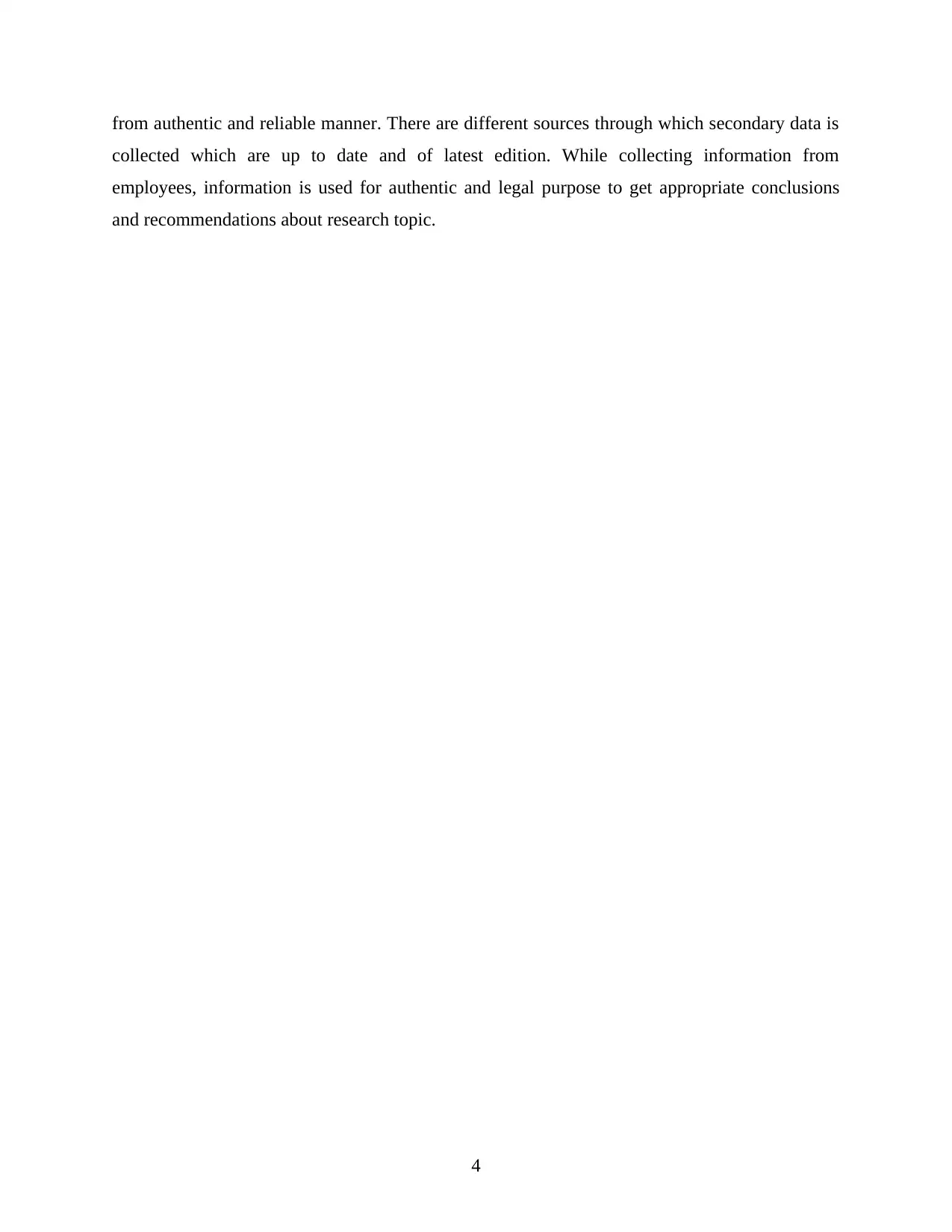
from authentic and reliable manner. There are different sources through which secondary data is
collected which are up to date and of latest edition. While collecting information from
employees, information is used for authentic and legal purpose to get appropriate conclusions
and recommendations about research topic.
4
collected which are up to date and of latest edition. While collecting information from
employees, information is used for authentic and legal purpose to get appropriate conclusions
and recommendations about research topic.
4
Paraphrase This Document
Need a fresh take? Get an instant paraphrase of this document with our AI Paraphraser
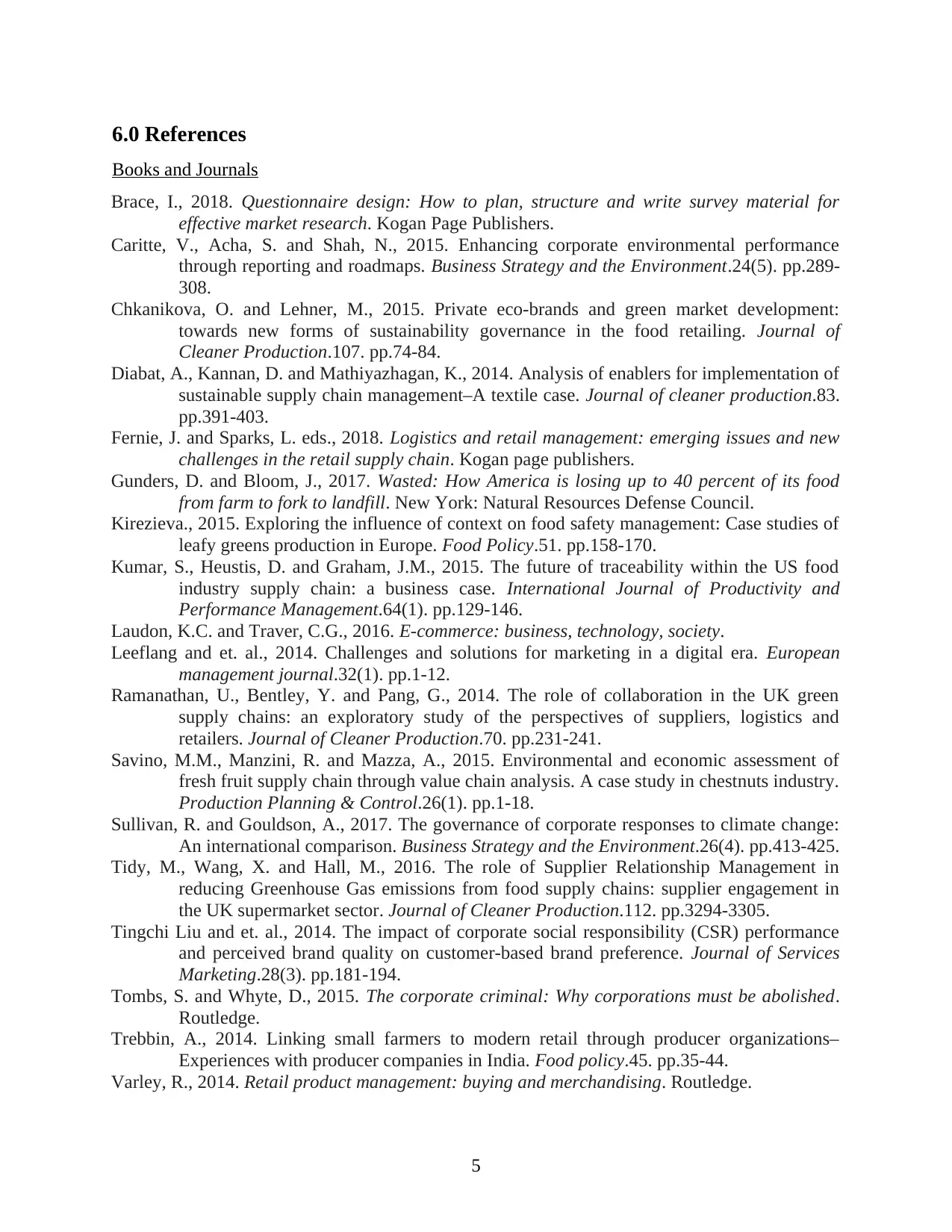
6.0 References
Books and Journals
Brace, I., 2018. Questionnaire design: How to plan, structure and write survey material for
effective market research. Kogan Page Publishers.
Caritte, V., Acha, S. and Shah, N., 2015. Enhancing corporate environmental performance
through reporting and roadmaps. Business Strategy and the Environment.24(5). pp.289-
308.
Chkanikova, O. and Lehner, M., 2015. Private eco-brands and green market development:
towards new forms of sustainability governance in the food retailing. Journal of
Cleaner Production.107. pp.74-84.
Diabat, A., Kannan, D. and Mathiyazhagan, K., 2014. Analysis of enablers for implementation of
sustainable supply chain management–A textile case. Journal of cleaner production.83.
pp.391-403.
Fernie, J. and Sparks, L. eds., 2018. Logistics and retail management: emerging issues and new
challenges in the retail supply chain. Kogan page publishers.
Gunders, D. and Bloom, J., 2017. Wasted: How America is losing up to 40 percent of its food
from farm to fork to landfill. New York: Natural Resources Defense Council.
Kirezieva., 2015. Exploring the influence of context on food safety management: Case studies of
leafy greens production in Europe. Food Policy.51. pp.158-170.
Kumar, S., Heustis, D. and Graham, J.M., 2015. The future of traceability within the US food
industry supply chain: a business case. International Journal of Productivity and
Performance Management.64(1). pp.129-146.
Laudon, K.C. and Traver, C.G., 2016. E-commerce: business, technology, society.
Leeflang and et. al., 2014. Challenges and solutions for marketing in a digital era. European
management journal.32(1). pp.1-12.
Ramanathan, U., Bentley, Y. and Pang, G., 2014. The role of collaboration in the UK green
supply chains: an exploratory study of the perspectives of suppliers, logistics and
retailers. Journal of Cleaner Production.70. pp.231-241.
Savino, M.M., Manzini, R. and Mazza, A., 2015. Environmental and economic assessment of
fresh fruit supply chain through value chain analysis. A case study in chestnuts industry.
Production Planning & Control.26(1). pp.1-18.
Sullivan, R. and Gouldson, A., 2017. The governance of corporate responses to climate change:
An international comparison. Business Strategy and the Environment.26(4). pp.413-425.
Tidy, M., Wang, X. and Hall, M., 2016. The role of Supplier Relationship Management in
reducing Greenhouse Gas emissions from food supply chains: supplier engagement in
the UK supermarket sector. Journal of Cleaner Production.112. pp.3294-3305.
Tingchi Liu and et. al., 2014. The impact of corporate social responsibility (CSR) performance
and perceived brand quality on customer-based brand preference. Journal of Services
Marketing.28(3). pp.181-194.
Tombs, S. and Whyte, D., 2015. The corporate criminal: Why corporations must be abolished.
Routledge.
Trebbin, A., 2014. Linking small farmers to modern retail through producer organizations–
Experiences with producer companies in India. Food policy.45. pp.35-44.
Varley, R., 2014. Retail product management: buying and merchandising. Routledge.
5
Books and Journals
Brace, I., 2018. Questionnaire design: How to plan, structure and write survey material for
effective market research. Kogan Page Publishers.
Caritte, V., Acha, S. and Shah, N., 2015. Enhancing corporate environmental performance
through reporting and roadmaps. Business Strategy and the Environment.24(5). pp.289-
308.
Chkanikova, O. and Lehner, M., 2015. Private eco-brands and green market development:
towards new forms of sustainability governance in the food retailing. Journal of
Cleaner Production.107. pp.74-84.
Diabat, A., Kannan, D. and Mathiyazhagan, K., 2014. Analysis of enablers for implementation of
sustainable supply chain management–A textile case. Journal of cleaner production.83.
pp.391-403.
Fernie, J. and Sparks, L. eds., 2018. Logistics and retail management: emerging issues and new
challenges in the retail supply chain. Kogan page publishers.
Gunders, D. and Bloom, J., 2017. Wasted: How America is losing up to 40 percent of its food
from farm to fork to landfill. New York: Natural Resources Defense Council.
Kirezieva., 2015. Exploring the influence of context on food safety management: Case studies of
leafy greens production in Europe. Food Policy.51. pp.158-170.
Kumar, S., Heustis, D. and Graham, J.M., 2015. The future of traceability within the US food
industry supply chain: a business case. International Journal of Productivity and
Performance Management.64(1). pp.129-146.
Laudon, K.C. and Traver, C.G., 2016. E-commerce: business, technology, society.
Leeflang and et. al., 2014. Challenges and solutions for marketing in a digital era. European
management journal.32(1). pp.1-12.
Ramanathan, U., Bentley, Y. and Pang, G., 2014. The role of collaboration in the UK green
supply chains: an exploratory study of the perspectives of suppliers, logistics and
retailers. Journal of Cleaner Production.70. pp.231-241.
Savino, M.M., Manzini, R. and Mazza, A., 2015. Environmental and economic assessment of
fresh fruit supply chain through value chain analysis. A case study in chestnuts industry.
Production Planning & Control.26(1). pp.1-18.
Sullivan, R. and Gouldson, A., 2017. The governance of corporate responses to climate change:
An international comparison. Business Strategy and the Environment.26(4). pp.413-425.
Tidy, M., Wang, X. and Hall, M., 2016. The role of Supplier Relationship Management in
reducing Greenhouse Gas emissions from food supply chains: supplier engagement in
the UK supermarket sector. Journal of Cleaner Production.112. pp.3294-3305.
Tingchi Liu and et. al., 2014. The impact of corporate social responsibility (CSR) performance
and perceived brand quality on customer-based brand preference. Journal of Services
Marketing.28(3). pp.181-194.
Tombs, S. and Whyte, D., 2015. The corporate criminal: Why corporations must be abolished.
Routledge.
Trebbin, A., 2014. Linking small farmers to modern retail through producer organizations–
Experiences with producer companies in India. Food policy.45. pp.35-44.
Varley, R., 2014. Retail product management: buying and merchandising. Routledge.
5
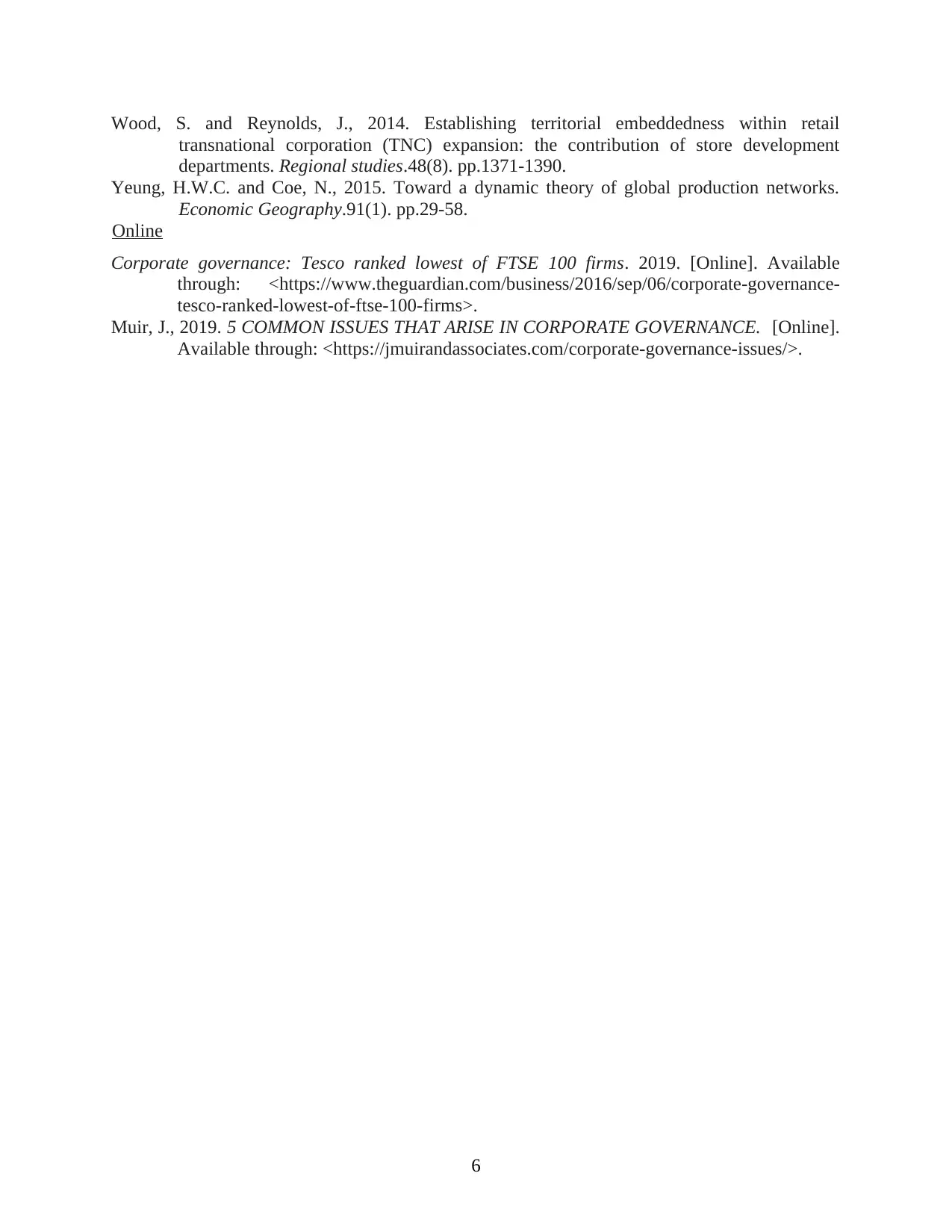
Wood, S. and Reynolds, J., 2014. Establishing territorial embeddedness within retail
transnational corporation (TNC) expansion: the contribution of store development
departments. Regional studies.48(8). pp.1371-1390.
Yeung, H.W.C. and Coe, N., 2015. Toward a dynamic theory of global production networks.
Economic Geography.91(1). pp.29-58.
Online
Corporate governance: Tesco ranked lowest of FTSE 100 firms. 2019. [Online]. Available
through: <https://www.theguardian.com/business/2016/sep/06/corporate-governance-
tesco-ranked-lowest-of-ftse-100-firms>.
Muir, J., 2019. 5 COMMON ISSUES THAT ARISE IN CORPORATE GOVERNANCE. [Online].
Available through: <https://jmuirandassociates.com/corporate-governance-issues/>.
6
transnational corporation (TNC) expansion: the contribution of store development
departments. Regional studies.48(8). pp.1371-1390.
Yeung, H.W.C. and Coe, N., 2015. Toward a dynamic theory of global production networks.
Economic Geography.91(1). pp.29-58.
Online
Corporate governance: Tesco ranked lowest of FTSE 100 firms. 2019. [Online]. Available
through: <https://www.theguardian.com/business/2016/sep/06/corporate-governance-
tesco-ranked-lowest-of-ftse-100-firms>.
Muir, J., 2019. 5 COMMON ISSUES THAT ARISE IN CORPORATE GOVERNANCE. [Online].
Available through: <https://jmuirandassociates.com/corporate-governance-issues/>.
6
⊘ This is a preview!⊘
Do you want full access?
Subscribe today to unlock all pages.

Trusted by 1+ million students worldwide
1 out of 9
Related Documents
Your All-in-One AI-Powered Toolkit for Academic Success.
+13062052269
info@desklib.com
Available 24*7 on WhatsApp / Email
![[object Object]](/_next/static/media/star-bottom.7253800d.svg)
Unlock your academic potential
Copyright © 2020–2026 A2Z Services. All Rights Reserved. Developed and managed by ZUCOL.





